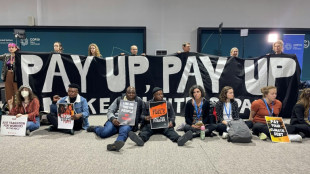
-
 US lawmaker accuses Azerbaijan in near 'assault' at COP29
US lawmaker accuses Azerbaijan in near 'assault' at COP29
-
Tuchel's England have 'tools' to win World Cup, says Carsley

-
 Federer hails 'historic' Nadal ahead of imminent retirement
Federer hails 'historic' Nadal ahead of imminent retirement
-
Ukraine vows no surrender, Kremlin issues nuke threat on 1,000th day of war

-
 Novo Nordisk's obesity drug Wegovy goes on sale in China
Novo Nordisk's obesity drug Wegovy goes on sale in China
-
Spain royals to visit flood epicentre after chaotic trip: media

-
 French farmers step up protests against EU-Mercosur deal
French farmers step up protests against EU-Mercosur deal
-
Rose says Europe Ryder Cup stars play 'for the badge' not money

-
 Negotiators seek to break COP29 impasse after G20 'marching orders'
Negotiators seek to break COP29 impasse after G20 'marching orders'
-
Burst dike leaves Filipino farmers under water

-
 Markets rally after US bounce as Nvidia comes into focus
Markets rally after US bounce as Nvidia comes into focus
-
Crisis-hit Thyssenkrupp books another hefty annual loss

-
 US envoy in Lebanon for talks on halting Israel-Hezbollah war
US envoy in Lebanon for talks on halting Israel-Hezbollah war
-
India to send 5,000 extra troops to quell Manipur unrest

-
 Sex, drugs and gritty reality on Prague's underworld tours
Sex, drugs and gritty reality on Prague's underworld tours
-
Farmers descend on London to overturn inheritance tax change

-
 Clippers upset Warriors, Lillard saves Bucks
Clippers upset Warriors, Lillard saves Bucks
-
Acquitted 'Hong Kong 47' defendant sees freedom as responsibility

-
 Floods strike thousands of houses in northern Philippines
Floods strike thousands of houses in northern Philippines
-
Illegal farm fires fuel Indian capital's smog misery

-
 SpaceX set for Starship's next flight, Trump expected to attend
SpaceX set for Starship's next flight, Trump expected to attend
-
Texans cruise as Cowboys crisis deepens

-
 Do the Donald! Trump dance takes US sport by storm
Do the Donald! Trump dance takes US sport by storm
-
Home hero Cameron Smith desperate for first win of 2024 at Australian PGA

-
 Team Trump assails Biden decision on missiles for Ukraine
Team Trump assails Biden decision on missiles for Ukraine
-
Hong Kong court jails 45 democracy campaigners on subversion charges

-
 Several children injured in car crash at central China school
Several children injured in car crash at central China school
-
Urban mosquito sparks malaria surge in East Africa

-
 Djibouti experiments with GM mosquito against malaria
Djibouti experiments with GM mosquito against malaria
-
Pulisic at the double as USA cruise past Jamaica

-
 Many children injured after car crashes at central China school: state media
Many children injured after car crashes at central China school: state media
-
Asian markets rally after US bounce as Nvidia comes into focus

-
 Tens of thousands march in New Zealand Maori rights protest
Tens of thousands march in New Zealand Maori rights protest
-
Five takeaways from the G20 summit in Rio

-
 China, Russia ministers discuss Korea tensions at G20: state media
China, Russia ministers discuss Korea tensions at G20: state media
-
Kohli form, opening woes dog India ahead of Australia Test series

-
 Parts of Great Barrier Reef suffer highest coral mortality on record
Parts of Great Barrier Reef suffer highest coral mortality on record
-
Defiant Lebanese harvest olives in the shadow of war

-
 Russian delegations visit Pyongyang as Ukraine war deepens ties
Russian delegations visit Pyongyang as Ukraine war deepens ties
-
S.Africa offers a lesson on how not to shut down a coal plant

-
 Italy beat Swiatek's Poland to reach BJK Cup final
Italy beat Swiatek's Poland to reach BJK Cup final
-
Japan, UK to hold regular economic security talks

-
 Divided G20 fails to agree on climate, Ukraine
Divided G20 fails to agree on climate, Ukraine
-
Can the Trump-Musk 'bromance' last?

-
 US to call for Google to sell Chrome browser: report
US to call for Google to sell Chrome browser: report
-
Macron hails 'good' US decision on Ukraine missiles

-
 Italy eliminate Swiatek's Poland to reach BJK Cup final
Italy eliminate Swiatek's Poland to reach BJK Cup final
-
Trump expected to attend next Starship rocket launch: reports

-
 Israeli strike on Beirut kills 5 as deadly rocket fire hits Israel
Israeli strike on Beirut kills 5 as deadly rocket fire hits Israel
-
Gvardiol steals in to ensure Croatia reach Nations League quarter-finals


'We love singing': Filipinos find joy in karaoke
At a busy tricycle terminal in Manila, driver Edgar Soriano slips a coin into a karaoke machine and belts out his favourite song while waiting for passengers.
Karaoke is wildly popular in the archipelago nation where it's never too early -- or too late -- to grab a microphone and sing a tune.
Machines can be found everywhere from cheap bars in far-flung villages to modern KTV joints in the cities, and many families have their own or rent one for parties.
For as little as five pesos (nine US cents) a song, many in the poverty-afflicted country can experience a few minutes of joy in the day.
Soriano, 53, smiles as he stands in a tiny eatery on a hot weekday afternoon singing the lyrics of British musician Albert Hammond's "When I'm Gone", which he seems to know by heart.
The karaoke machine is one of six at the terminal, but drivers and passengers waiting for a ride appear unbothered by the competing songs reverberating through speakers.
"I always sing that song, it's my favourite," said Soriano, wearing a long-sleeved Jordan top and tracksuit pants.
After consulting a well-thumbed plastic folder of songs, street sweeper Bernardo Aguire, 67, settles on Frank Sinatra's "My Way", and pops a coin into the slot.
It is a bold choice in a country where the song has reportedly gotten people killed -- allegedly because they sang it poorly.
Aguire, unfazed by the stories that have become an urban legend, finishes his rendition unscathed.
Felomina Hernane, 52, owns the eatery where the karaoke machine cranks up at 8:00 am and doesn't stop until 10:00 pm or later, seven days a week.
She bought the machine to attract customers and it's been a boon to earnings, bringing in as much as 18,000 pesos a month.
"It's a huge help for my business," Hernane told AFP.
Hernane said singing makes the drivers happy.
"It entertains them," she said.
"It's a way to relax after driving."
- 'It takes away my stress' -
In a crowded neighbourhood in Manila, tricycles deliver karaoke machine casings to stores where they are fitted with speakers, amplifiers and televisions.
Their prices depend on the quality of the electronics inside them, with a basic machine starting at around 19,000 pesos and a premium version topping 46,000 pesos.
Alfred Condez works at a store overflowing with machines in various stages of assembly. It takes several hours for employees to finish wiring one, and customers are often happy to wait.
"We love singing," said Condez, 40.
As if to prove his point, he picks up a microphone and stands on the footpath to test an assembled machine's sound quality, his deep voice echoing into the noisy street.
The busiest period for the karaoke assembly business is November and December, when Filipinos hold Christmas and New Year parties, said Condez. His shop sells as many as 10 machines a day in those months.
Karaoke took off in the Philippines in the 1980s, said Krina Cayabyab, a vocal instructor and associate professor in the University of the Philippines' music department.
But she said the country's love of singing was deeply rooted in its colonial past, starting with the Spanish and then the Americans, whose music was absorbed by Filipinos.
"It's really tied into that reproducing and borrowing of stuff that Filipinos would hear," Cayabyab said.
Singing is one of the few affordable entertainment options for many Filipinos.
In a hardscrabble district of Manila, children and young adults gather outside a small store where the karaoke machine is in high demand.
"My friends and I are just hanging out because it's boring at home," said Honey Servito, 24.
"I'm not really a singer, it's just that when we have nothing better to do at home, my friends and I go here and sing," she said.
"It takes away my stress and boredom."
A.Williams--AT



